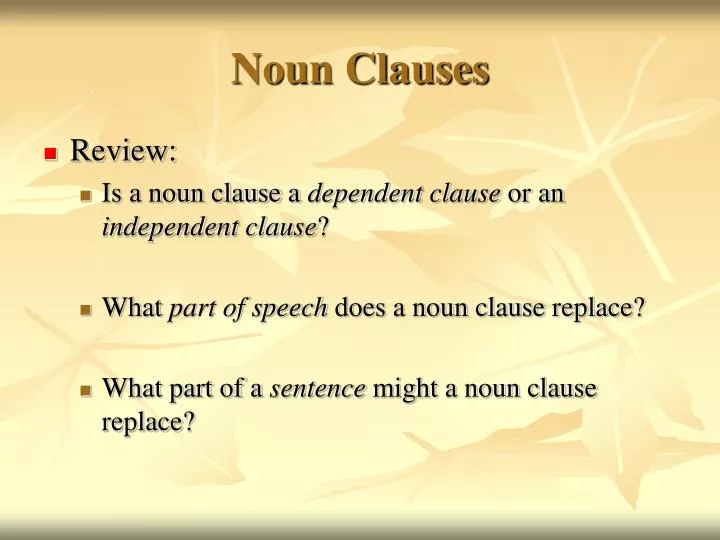What Is Noun Clause - Chapter 12 noun clauses - A noun clause is a group of words that contains a subject and a verb.. How, that, what, whatever, when, where, whether, which, whichever, who, whoever, whom, whomever, and why. A clause is a group of words containing a subject and a verb. • noun clauses what's a noun clause? A noun clause can act as subjects, objects (direct objects and indirect objects), predicate nominatives, complements, or objects. Noun clauses can act as subjects, direct objects, indirect objects, predicate nominatives.
A noun clause is a dependent clause that functions as a noun. Noun clauses come after the words such as how, that, what, whatever, when, where, whether, which, whichever, who, whoever, whom, whomever , and why. A noun clause usually begins with the following words: It might be a noun clause. For example, if the sentence asks do you know what time we are leaving? the noun clause is what time we are leaving? you can't easily substitute a noun here.
/Getty_noun_clause-102701000-57e47a443df78c690fb9ff86.jpg)
He said that he would help me.
What does noun clause mean? • no one knows who he is. What i had forgotten was that i had a test today. What i like doing most of all in the evenings, these days, is sitting in a formless stupor in front of the television, eating chocolate. So, what is the noun clause? Noun clauses can act as direct objects, subjects , indirect. They're cool because the whole clause acts as a noun. Why he did that is a mystery. A noun clause can function as what you have done pleased so many fans. We offer clauses definition, clauses meaning, and all types of clauses and some clauses examples with clauses exercises. Noun clauses generally begin with words such as how, that, what, whatever, when, where, whether, which, whichever, who, whoever, whom, whomever, and why. A noun clause functions as noun in a sentence. A noun clause can act as subjects, objects (direct objects and indirect objects), predicate nominatives, complements, or objects.
For example (noun clauses shaded) (this noun clause is the direct object of ask.) he knows all about art, but he doesn't know what he likes. Noun clauses are a type of subordinate clause. A noun clause can act as subjects, objects (direct objects and indirect objects), predicate nominatives, complements, or objects. Noun clauses begin with words such as how, that, what, whatever, when, where, whether, which, whichever, who, whoever, whom, whomever, and why. Like all clauses, a noun clause contains a subject (sometimes represented by one of the words above) and a predicate (a verb and any additional information i want to see what is available before i make a purchase. (what is available is the direct object of the verb see.) at this point, we'll take whatever.
A noun clause is a subordinate clause in a complex sentence that acts as a noun.
Noun clauses are subordinate clauses or dependent clauses that perform eight grammatical functions. What is a noun clause? We offer clauses definition, clauses meaning, and all types of clauses and some clauses examples with clauses exercises. A noun clause is a group of words that contains a subject and a verb. The noun clause is a clause that functions like a noun in the sentence. A noun clause is a kind of subordinate clause. A noun clause is a dependent clause that contains a subject and a verb. A noun clause functions as noun in a sentence. • no one knows who he is. Noun clauses can act as subjects, direct objects, indirect objects, predicate nominatives. • i did not know what he would do next. I'm elizabeth o'brien, and my goal is to get you jazzed about grammar. Find out why noun clauses that start with a question are used to answer a question.
A noun clause (also called nominal clause ) is a dependent clause that plays the role of a noun. A noun clause is a dependent clause that contains a subject and a verb. I have a surprise for whoever wins the race. A noun clause is a clause that plays the role of a noun. It might be a noun clause.

Noun clauses begin with words such as how, that, what, whatever, when, where, whether, which, whichever, who, whoever, whom, whomever, and why.
…what you have learned. this clause is a noun clause. A noun clause is a dependent clause that contains a subject and a verb. This page has lots of examples of noun clauses and an interactive exercise. Like all clauses, a noun clause has a subject and a verb. Noun clauses begin with words such as how, that, what, whatever, when, where, whether, which, whichever, who, whoever, whom, whomever, and why. It acts as a noun. A noun clause is always a dependent clause, meaning it's a part of the sentence that can't stand on its own as an independent thought. Find out why noun clauses that start with a question are used to answer a question. A noun clause is a group of words that contains a subject and a verb. A noun clause can function as what you have done pleased so many fans. What is a noun clause? Noun clauses are subordinate clauses or dependent clauses that perform eight grammatical functions. It might be a noun clause.
